Note from Sharon: Hi travel friends! We’re pulling this post out of our archives because so many people are home and spending more time on Facebook. With that, not surprisingly, more travel hoaxes are popping up on Facebook. We think this is an excellent time to remind everyone about how to recognize hoaxes and what to do when you see one.
Hoaxes and scams. If you’re on Facebook, you know you’ve seen then. You can win two free tickets on Southwest Airlines! Or on Delta Airlines! Or on JetBlue! Or you can get a free Disney Cruise! Or a free Celebrity Cruise! Or a free Princess Cruise! Or you can win an all-expenses-paid vacation! Or an RV! All you have to do is like this page! Or share this page! Or send it to 13 of your closest friends! Or reply to this message with any number between 1 and 100!
Hoaxes have been around for about as long as people have been buying and selling things. Whether it was a traveling salesman hawking a mysterious liquid guaranteed to stop everything that ailed you to a Nigerian woman who said she lost her husband,
needed a small loan, and would pay you tenfold after her inheritance comes in, scams have been preying on the hopeful, the kind-hearted and the naive for centuries. Nowadays the hoaxes have become more high-tech, received via email, robocalls and Facebook, but they’re still all the same – give something to someone (money, contact info, shares, likes & replies) and receive nothing in return. Here’s a quick explanation from consumeraffairs.com of why scammers do this:
Since Facebook’s algorithms place a high value on popularity (as measured by likes and shares), these highly liked and shared pages therefore have a much higher chance of appearing in people’s “Feeds” and being seen by other Facebook users.
Then, once the page has a sufficiently high popularity rating, the like-farmer either removes the page’s original content and replaces it with something else (usually malware or scam advertising); leaves the page as is and uses it as a platform for continued like-farming in order to spread malware, collect people’s marketing information or engage in other harmful activities; or outright sells the highly liked site to cybercriminals in a black market web forum.
Want proof? Here’s what’s been posted on the Facebook page of Disney Cruise Lines (as opposed to the legit Disney Cruise Line…who probably wouldn’t use “@Disneyyycruises” either) in the past few years:
UPPER LEFT: October 13, 2017 – Halloween ad copied/photo from Disney
UPPER RIGHT: October 25, 2017 – Marvel Super Heroes material copied from/linked to Disneyparks.disney.go
MIDDLE: June 24, 2018: You could wind an all-inclusive vacation to…the Maldives? (since when does Disney do anything in the Maldives?)
LOWER LEFT: August 3, 2018: Win a $500 ALDI gift card! (this ad was subsequently pulled. Maybe because they realized Disney has nothing to do with Aldi?)
LOWER RIGHT: August 3, 2018: Get free Dunkin’ Donuts for a month! (Whoops, never mind the “…because it has nothing to do with Disney”)
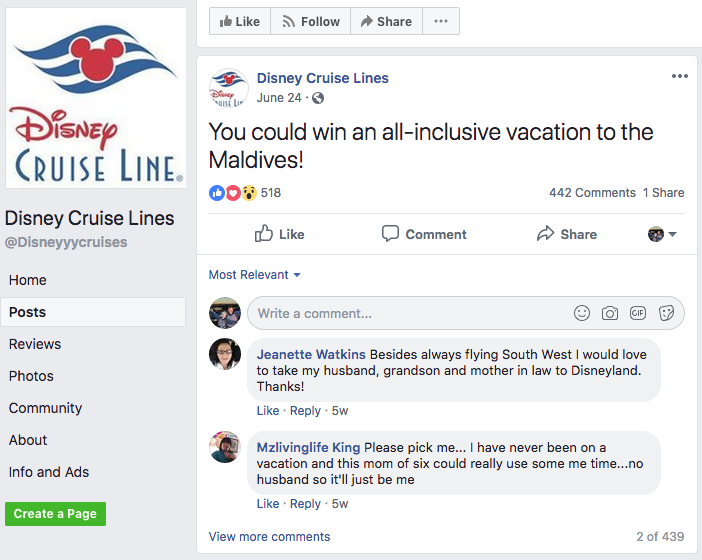
So…yeah… #rolleyes The above page alone has over 77,000 likes and hundreds of people who like and share each post to win something that has DOESN’T EVEN HAVE ANYTHING TO DO WITH DISNEY!
Now, I can’t help you stop the “Dear sir madam” spam emails from Nigerian widows, but here’s how to avoid falling for the travel hoaxes on Facebook:
1. If it sounds too good to be true, there’s a 99% chance that it is
With very rare exceptions, no one, not even a multi-billion company like Disney, an airline or even Apple (cuz free iPads are another big hoax topic), is going to give away anything substantial for free. Not for their birthday, not because of their millionth customer, not for any reason. On the rare occasion a large company is having real sweepstakes or giveaway, they will have a bona fide webpage to promote it, complete with a list of fine print that includes terms and conditions, not just a Facebook page. So think before you click.
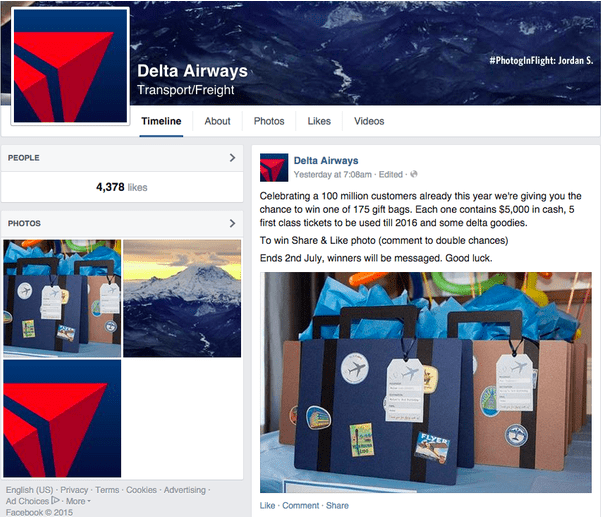
Why would Delta give away 175 gift bags? Think about it for a second…WHY?
2. Does the site have a blue checkmark next to its name?
If it does, that says Facebook has vetted them as authentic. If there’s no checkmark, it’s not the official site.
3. How many fans does the page have?
Cruise lines, airlines and theme parks have millions upon millions of Facebook fans. Scammers have thousands.
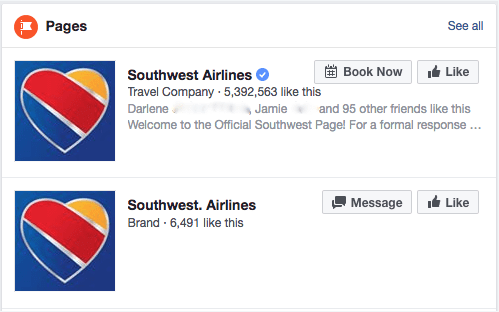
More than 5 million fans vs. a site with 6,000 and change. For a major U.S. airline. Which do you think is real?
4. The name of the page is slightly different from the official name
You’ll see an extra letter, some weird punctuation that normally wouldn’t be there, an extra word, a removed word, a changed word, etc. Disney Cruise Lines (or The Disney Cruise) instead of Disney Cruise Line. Walt–Disney World (or the shortened Disney World [2 words] or DisneyWorld [1 word]) instead of the proper and official Walt Disney World.
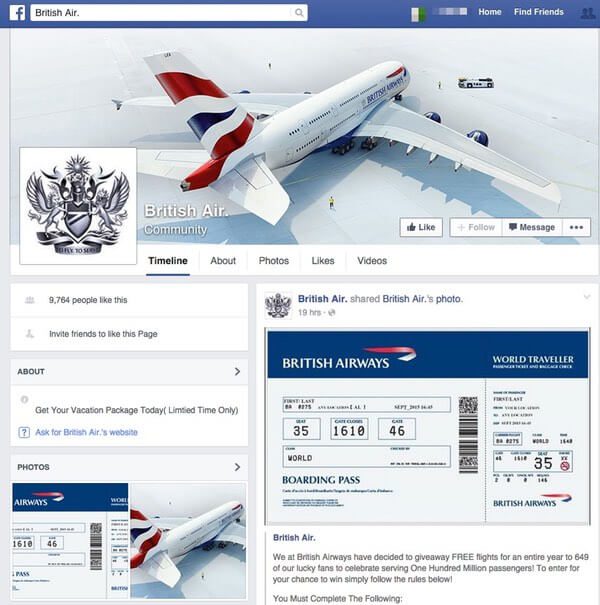
“British Air.”? No. No “Air,” no period at the end. The official name is British Airways
5. Are they writing in the style of their country they’re from? Are they writing with proper spelling, punctuation, etc.?
Disney, Southwest, etc. are all American companies. If you see accent marks on letters (i.e. “Sharè & likè” in pic #1 below), or the U.K. and European style of writing the date before the month (i.e. 28th May 2017 in pic #2 below), those are indicators that the site is that of a scammer (who is most likely not in this country). Professional companies also make sure to use proper grammar, punctuation, use to capitalization, etc. in their write-ups…scammers not so much (Also notice below that the same picture was used for the Southwest AND Disney Cruise Line hoaxes. Thanks to my friend Pam for the heads up on the Southwest version!).
So what should you do if you see one of these hoax contest/sweepstakes/giveaways?
Well, definitely don’t share it, don’t comment on the page and don’t like the page – all you’d be doing is adding to their “Like & Share” farming. And if you DO wind up sharing the page by mistake and someone tells you it’s a hoax, for heaven’s sake, delete the post so you don’t perpetuate the problem by leaving the post available for your FB friends to see (and share)! You can report them to Facebook by going to the offending page and clicking on the 3 dots (on your phone it will be in the upper right-hand corner of the page. On your computer it will be just under the timeline photo, next to the “Like,” “Follow” and “Share” boxes) and REPORT it as IT’S A SCAM.
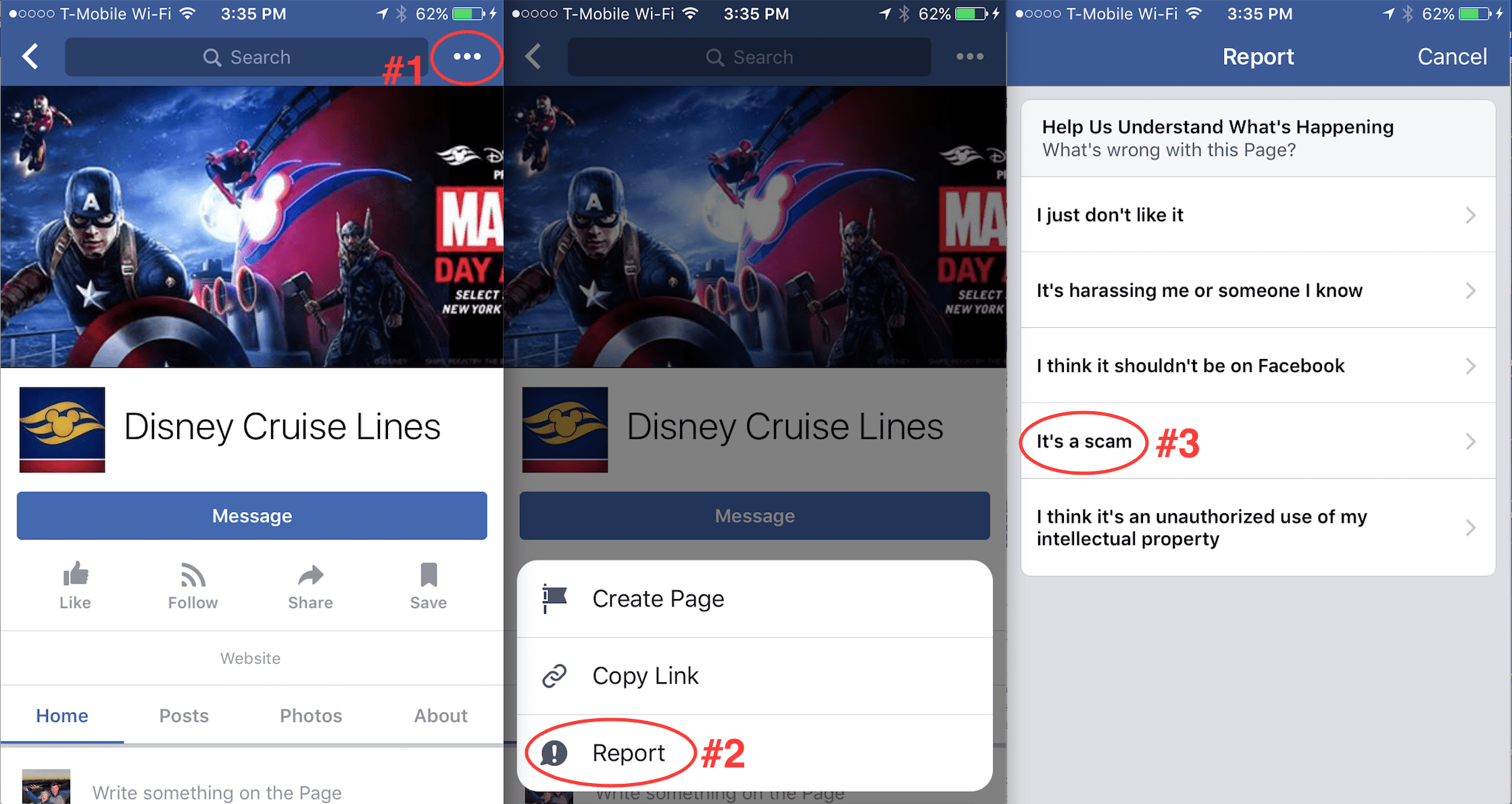
As would be seen on a phone
You can also tell the “real” cruise line or airline or whatever that there’s a scammer posing as them – you occasionally will get feedback from them, thanking you, telling you they’re aware, etc. (do this one IN ADDITION TO reporting the scammers, not INSTEAD OF).
I also say something to friends when I see they’re posting a hoax – usually how I know it’s a hoax, a request to delete whatever they’ve shared so they don’t continue the trend, and for them to also report the offending site. But that’s me. Your Mileage May Vary.
There are a bunch of websites out there that can make you aware of hoaxes and scams. Snopes is well known but there’s also Facecrooks, That’s Nonsense and several others. Anything you can do to keep you, your friends and your family informed is great!
Like this post? Please share it! We have plenty more just like it and would love if you decided to hang around and get emailed notifications of when we post. Or maybe you’d like to join our Facebook group – we have 12,000+ members and we talk and ask questions about travel (including Disney parks), creative ways to earn frequent flyer miles and hotel points, how to save money on or for your trips, get access to travel articles you may not see otherwise, etc. Whether you’ve read our posts before or this is the first time you’re stopping by, we’re really glad you’re here and hope you come back to visit again!
This post first appeared on Your Mileage May Vary

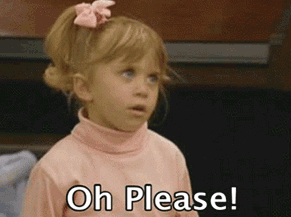
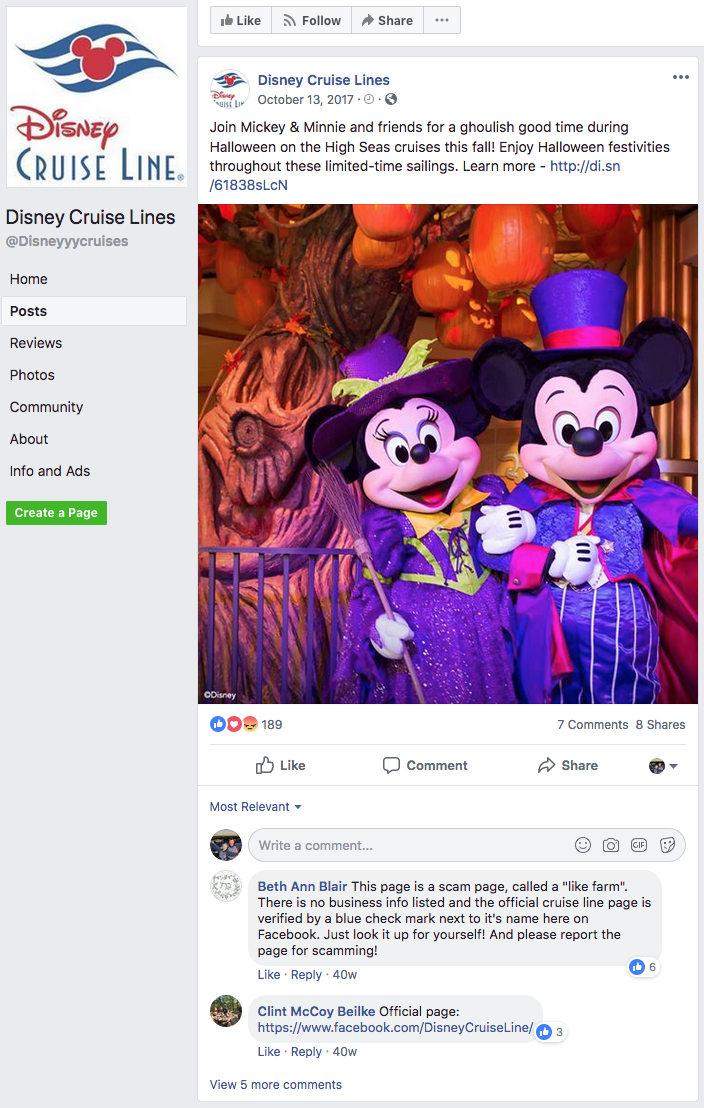
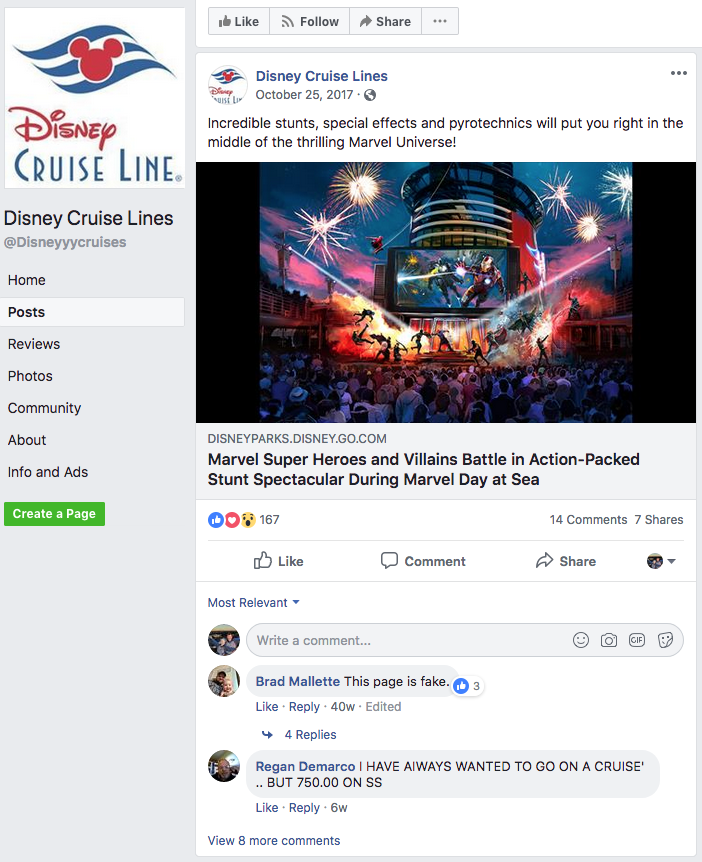
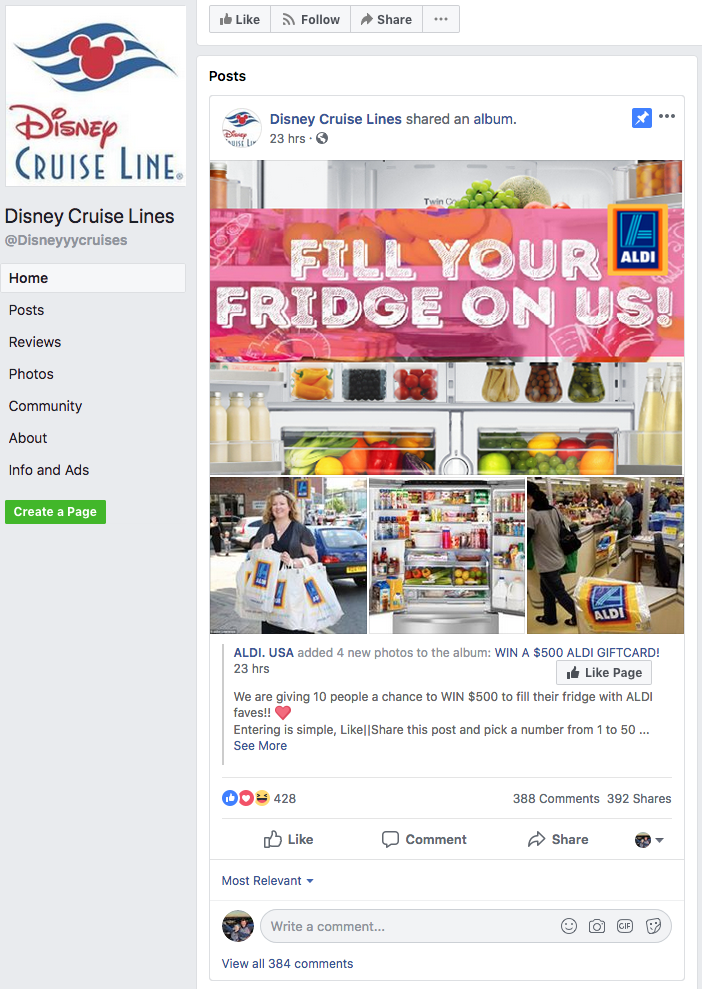
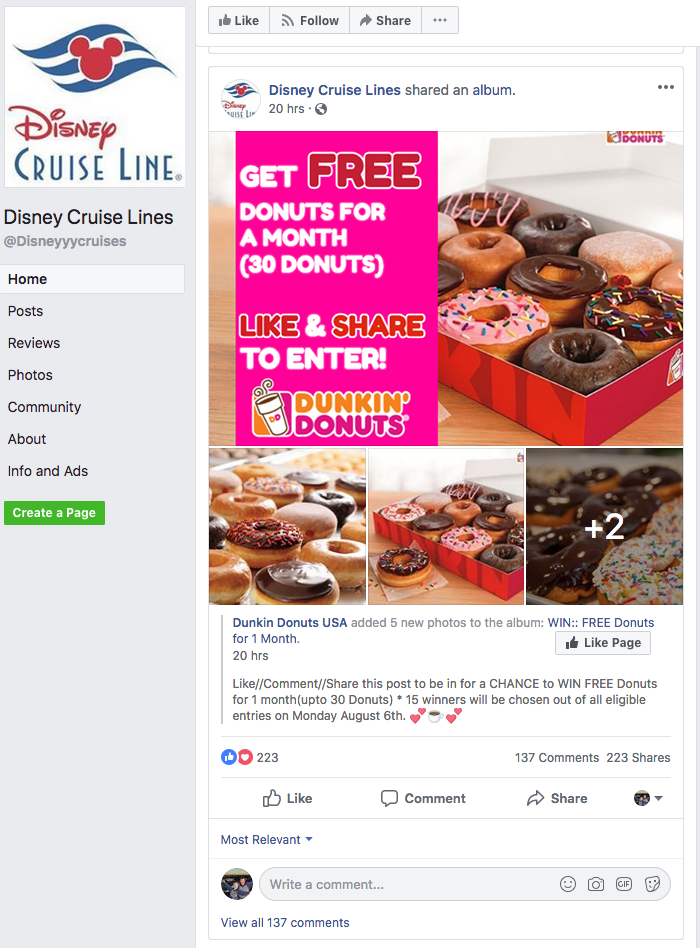
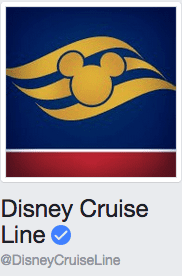
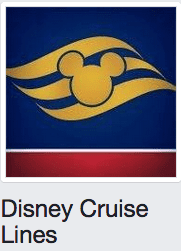



7 comments
[…] different ways to recognize a travel-related hoax on Facebook (because really, Delta is not giving away free flights and the Disney Cruise Line is not giving […]
[…] my post about all the travel-related hoax contests and sweepstakes on Facebook, where you could win free cruises, free airline tickets etc.? Well, we just got wind of a sweepstakes JetBlue is running and although […]
[…] Fall For Those “Free Disney Cruise” Facebook Hoaxes: I appreciated this post on Your Mileage May Vary. The post has some good tips on how to tell if the account/contest is legit. I see people share […]
There are legitimate sweepstakes companies out there such as Publishers Clearing House. But they ALWAYS come to your door to deliver the prize, with no taxes, fees or other add-ons. And you can ONLY win if you go to their website and enter.
Don’t click on the hoax slayer link. Goes to a porn site.
Oh wow! I promise it was NOT a porn site when I originally wrote (and reposted) the post. I’ve deleted the link. Thank-you for the heads up.
[…] The same image has been used previously for Disney World Cruise hoaxes. […]